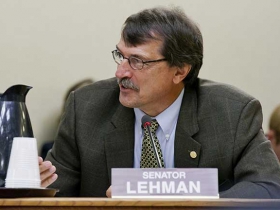Republicans Should Retain Legislature This Fall
Democrats hope to retake Senate but their chances don't look good.
Sometimes it seems as though the predictive tools used in elections have become so powerful that actual voting is superfluous: The pollsters and pundits can just look at the data and declare the winners in advance.
Consider the upcoming fall elections in the state Legislature, where an uncommonly large number of incumbents are not seeking reelection. At least 21 state Assembly reps, including 14 Republicans, are moving on to other things. There will also be at least six open Senate seats.
Could this be an opportunity for minority Democrats to make major gains, maybe even retake control? The pundits are shaking their heads.
Joe Handrick, a former Republican lawmaker who helped redraw voter boundaries, calculated before the 2012 election that this process created 50 GOP-friendly seats, compared to 38 for the Democrats. It left just 11 “swing” seats, where voters’ party picks averaged within a four-point margin in recent key elections.
These prognostications proved correct. In the 2012 elections, Republicans slightly increased their lead in the Assembly despite getting fewer votes than Democrats overall.
Earlier this year, a published tally of the 2012 legislative election results gave Republicans a 52-36 advantage in the Assembly, in terms of districts where one party had a six-point margin or better. Again, just 11 seats — one in nine — fell into the category “toss-up.”
A separate analysis by the Wisconsin Center for Investigative Journalism shows that just five open Assembly seats are in districts where voter party picks were within six points in either the 2012 presidential or U.S. Senate race.
“Certainly redistricting made things more challenging for us,” says Joel Gratz, executive director of the Assembly Democratic Campaign Committee. “But there are still Democratic-leaning and very competitive seats that we can pick up.” The party’s goal is to “make some reasonable gains.”
In the state Senate, the GOP’s margin of control is slimmer, 18-15, and the Democrats’ challenge less daunting. Here 17 seats are up for election, including three seats being vacated by incumbents in each party.
Democrats are expected, due in part to redistricting, to lose the seat now held by John Lehman, who is running for lieutenant governor. But they have a good shot at the seats being vacated by Dale Schultz, R-Richland Center, and Mike Ellis, R-Neenah, who was caught on tape discussing illegal campaign tactics.
If all this happened, the Dems could control the Senate with one additional win. The key battlegrounds will be the seat being vacated by Joe Leibham, who is running for Congress, and those of fellow Republicans Terry Moulton, Frank Lasee and Jerry Petrowski, who are seeking reelection.
But the 2012 election results show how hard this will be. In the presidential race, voters in these four districts favored Republican Mitt Romney over Democrat Barack Obama by margins of at least 3.4 percentage points. And Republicans tend to do better in midterm elections.
Thus, after however many millions of dollars are spent on these legislative elections, Republicans will likely control the Legislature for at least two more years. But nothing’s certain.
“Public opinion can overwhelm redistricting, but only when public opinion is moved very strongly in one direction or another,” says Charles Franklin, director of the Marquette Law School Poll. He notes that Democrats did well in 2006 and 2008, and Republicans triumphed in 2010, for exactly such reasons.
So far, however, there is no evidence of any such surge. In fact, recent poll results showing that a majority of residents think Wisconsin is headed in the right direction will likely buoy Gov. Scott Walker and other Republicans.
Of course, Franklin allows, “It’s perfectly possible that things will change before Election Day.”
If so, the polls will show it.
Bill Lueders is the Money and Politics Project director at the Wisconsin Center for Investigative Journalism (www.WisconsinWatch.org). The Center produces the project in partnership with MapLight.
The Center collaborates with Wisconsin Public Radio, Wisconsin Public Television, other news media and the UW-Madison School of Journalism and Mass Communication. All works created, published, posted or disseminated by the Center do not necessarily reflect the views or opinions of UW-Madison or any of its affiliates.
-
Wisconsin Lacks Clear System for Tracking Police Caught Lying
 May 9th, 2024 by Jacob Resneck
May 9th, 2024 by Jacob Resneck
-
Voters With Disabilities Demand Electronic Voting Option
 Apr 18th, 2024 by Alexander Shur
Apr 18th, 2024 by Alexander Shur
-
Few SNAP Recipients Reimbursed for Spoiled Food
 Apr 9th, 2024 by Addie Costello
Apr 9th, 2024 by Addie Costello






















